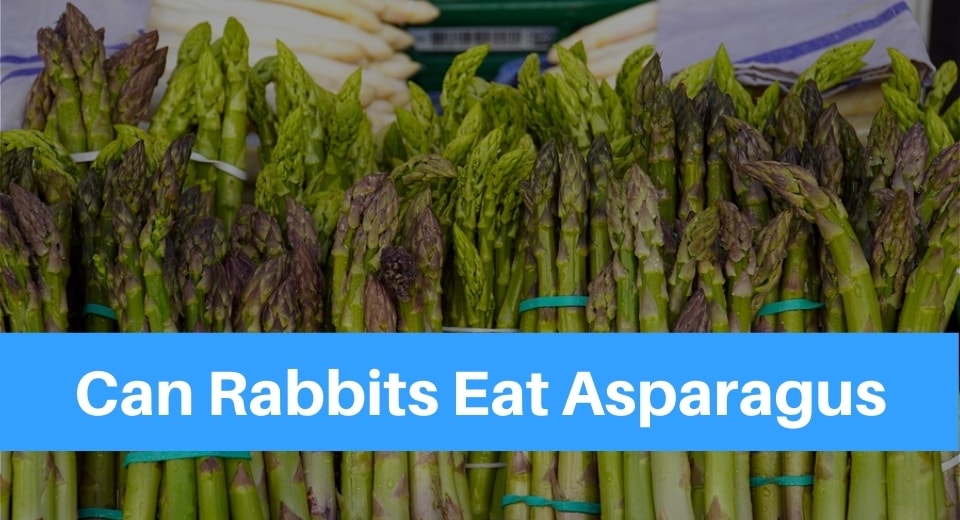Asparagus is considered to be one of the most nutritious vegetables, available in the market. It is, in fact, an exceptional veggie, which contains almost 93 percent of water; however, the calories and sodium content in this vegetable may be found to be very low.
Though most part of the vegetable contains water, you can still find a high amount of minerals as well as vitamins, including vitamins B6, C, E and K, zinc, calcium, folic acid, magnesium, iron, riboflavin, potassium and many more. In addition to it, fiber and protein are also present in this vegetable. The vegetable is called as asparagus as it contains amino acid, named as asparagines. Due to this high nutritional value of the vegetable, asparagus seems to be a healthy treat for your rabbits.
In the past, when modern medicine was not introduced, asparagus was accepted for its therapeutic features. Because of its high fiber and water content, this veggie may act as a suitable diuretic and laxative for your rabbits.
So, it may assist to make the excretory and urinary organs work at its best level. Its consumption also enables uric acid dissolution and balances sodium level in your rabbits’ blood.
Constituents found in asparagus
Asparagus may be considered as a kind rejuvenator or a stimulant for the nerves. If your rabbit consumes this vegetable at the right amount, it will build up its immune system as well as assist in developing overall mental and physical health. Thus, it is good not only for your rabbits but also your health.
Another thing that is found in asparagus is rutin, which is flavonoid has anti-inflammatory resources. With the consumption of asparagus, your rabbit may be able to keep away from blood clotting. It also improves the capillaries’ permeability, toughens the vessels of blood and saves them from being weak. It also stops the stiffening of their arteries with the reduction of blood viscosity. It also enables your rabbit to have good cardiovascular health.
Can you give asparagus to your rabbit?
Though asparagus has lots of beneficial constituents, you need to be careful while you give it to your rabbits because introduction of new foods sometimes cause stomach problems in the animals. The same is the case for rosemary and rabbits. Make sure that you are adding only one kind of new food at a particular time. While you are going to introduce asparagus to your diet of your bunny, remember that it should not be given until the animal is completely matured.
Otherwise, your small rabbit may find it hard to bite the stem of asparagus. Besides, it is also very difficult to digest those things, if your rabbit is too young right now. During your initial introduction of asparagus to your pet’s food, you may provide just a small part of it. Then wait for one day to see its reaction. When you notice that the stool of your rabbits turns out to be soft after consuming asparagus, you may withdraw the veggie and go for a diverse item until their stool begins to be normal.
Generally, you require waiting almost five to seven days prior to allowing your pet to try it once more. In this way, you may see whether your rabbits’ stomach can accept it. This same rule may be applicable when you are offering some new food to a rabbit.
More instructions to maintain your rabbits’ health
In order to maintain the health of rabbits, you should also supply clean water all the time. Never get shocked when you see a rabbit consuming whatever they have excreted. Bunnies assimilate their food two times to allow themselves to take out the maximum amount of minerals, vitamins or proteins. The excretions appear as kidney-like droppings, which are coated with mucous. Thus, when the bunny excrete its waste materials time and again, it is extremely beneficial for their body. Asparagus is such a vegetable, which may assist to encourage excretion of rabbits.
There is another means through which you may be certain that the bunnies are having sufficient amount of fiber; you may buy pellets, which are rich in fiber. While you visit any pet store, you may search for food supplements, which have a minimum eighteen percent of fiber. In fact, the pellets, which constitute natural components like timothy oats or alfalfa, may be the most excellent pellets.
Keep in mind that you may have to include more veggies into the diet of your rabbit. The general rule, which you have to remember, is that a rabbit, who average weight is about 2.5 kilos, must get fresh vegetables (minimum 1.5 to 2.5 cups) on a daily basis.
On the other hand, an adult rabbit may require low energy foodstuff also in order to avoid diabetes. So, you may shift your rabbits’ diet plat from simple pellets to some fresh vegetables and hays. Rabbits acquire major part of nutrition by consuming hays, which are best options not just because they benefit their health, but also because they keep your rabbits entertained all the time. Most of the bunnies like to chew these hays.
Thus, it may be concluded that besides giving asparagus, you have to add some other vegetables or fruits to your bunny’s diet.
However, while providing asparagus, you need to consider the proper amount. It is better to speak with vets so that they may give recommendations about the right quantity of vegetables to be given to your rabbit. You can also check our article on green beans and whether they may be good for your pet rabbit.

